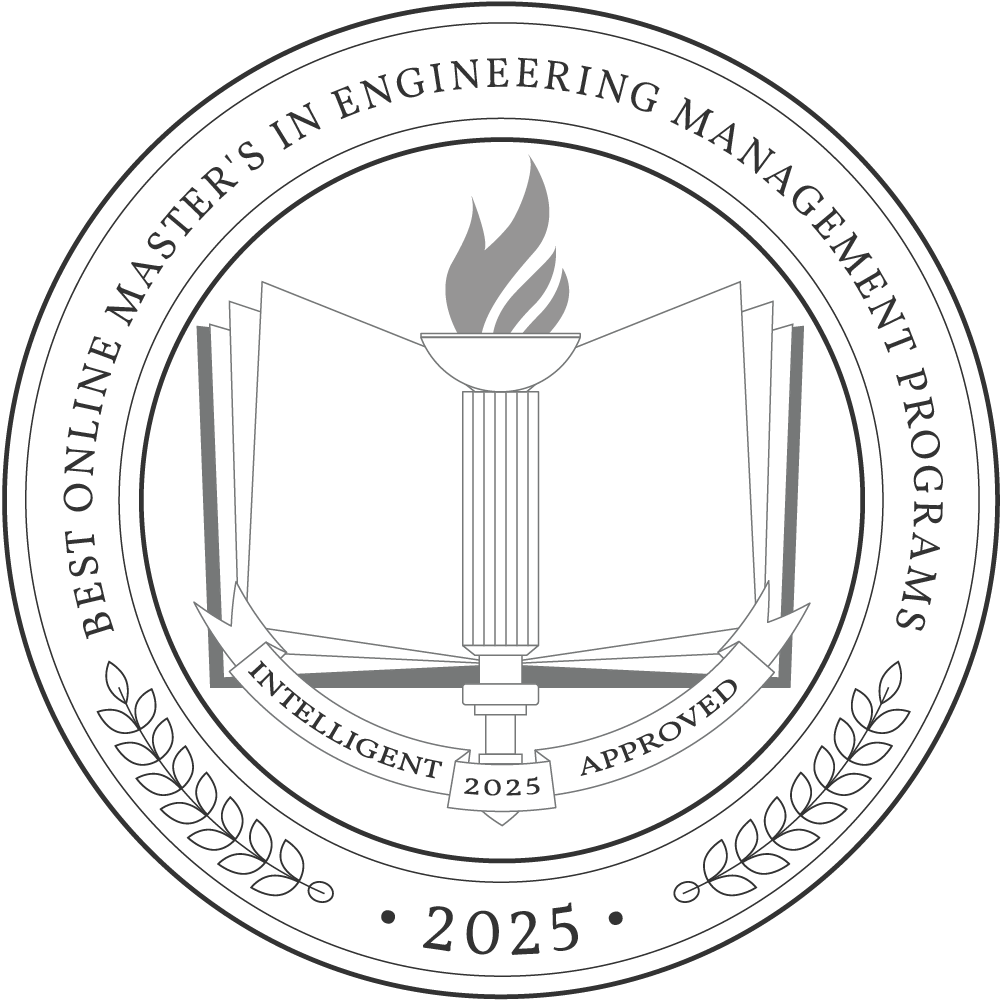By completing an online master’s in engineering management, students can further their understanding of engineering theory and practices while preparing for a leadership or administrative role in the engineering workforce. Afterward, graduates may qualify for an architectural and engineering management job and can expect to earn an average salary of $159,920.
According to U.S. News & World Report, the cost of an online master’s in engineering management degree runs between $9,000 to $35,000 in total tuition. Most programs run between 30 to 36 credits, meaning most full-time students can complete the program in two years. You may even be able to complete the program in one year with an accelerated schedule.
We interviewed Michelle Pickett, director of Northern Illinois University’s Academic Advising Center, for guidance on finding the right online master’s degree program, choosing an accredited institution, and exploring potential career paths in engineering management.
Why Trust Us
The Intelligent.com Higher Education Team is dedicated to providing students with independent, equitable school and program rankings and well-researched resources. Our expert-driven articles cover topics related to online colleges and programs, paying for school, and career outlooks. We use data from the U.S. Department of Education’s College Scorecard, the National Center for Education Statistics, and other reputable educational and professional organizations. Our academic advisory team reviews content and verifies accuracy throughout the year for the most current information. Partnerships do not influence rankings or editorial decisions.
- Analyzed over 2,000 national, accredited, and nonprofit colleges and universities
- 800+ rankings pages are reviewed and updated yearly
- Content is informed by reputable sources, surveys, and interviews with academic advisors and other experts
- Over 100 data points are reviewed for accuracy and quality throughout the year, including sources
How we rank schools
Our list features the best online Engineering Management degree programs at top colleges nationwide. Each school featured is a nonprofit, accredited institution — either public or private — with a high standard of academic quality for post-secondary institutions.
We evaluated each school’s program on tuition costs, admission, retention and graduation rates, faculty, reputation, and the student resources provided for online students. We collected data from trusted sources like the National Center for Education Statistics, individual school and program websites, school admissions counselors, and other data sources. Then, we calculated the Intelligent Score on a scale of 0 to 100 based on the following criterion:
Academic Quality:
- Admission rate versus enrollment rate
- Retention rate of students who return after year one
- Accreditation status (regional and programmatic)
- Nonprofit status, both private and public institutions
Graduation Rate
- Overall graduation rate
- Total number of currently enrolled students, including diversity metrics
- Student-to-faculty ratio
Cost and ROI
- In-state and out-of-state per-credit tuition rates and fees
- Required credits to graduate
- Earning potential after graduation
- Availability of federal student loans, scholarships, and other financial aid options
Student Resources
- Available student services for online-only and hybrid programs
- On-campus amenities like tutoring centers and the number of libraries
Read more about our ranking methodology.
Best 49 Accredited Online Master’s in Engineering Management Programs
FiltersInstitution Type
Status
- Intelligent Score
- Alphabetically By University Name
- Acceptance Rate
- Enrollment
- In-state Graduate Tuition
- Out-of-state Graduate Tuition
- In-state Undergraduate Tuition
- Out-of-state Undergraduate Tuition

Duke Pratt School of Engineering
Intelligent Score: 99.95In-state: $55,880
Out-of-state: $55,880
In-state: $57,900
Out-of-state: $57,900
SAT: 1470-1570
ACT: 34-35
$2,144
Online, On-Campus
Southern Association of Colleges and Schools Commission on Colleges
30

Lawrence Technological University
Intelligent Score: 99.58In-state: $35,430
Out-of-state: $35,430
In-state: $17,318
Out-of-state: $17,318
SAT: N/A
ACT: N/A
$1,410
Online, On-Campus
Higher Learning Commission
36

University of Central Florida
Intelligent Score: 98.98In-state: $4,478
Out-of-state: $19,810
In-state: $6,916
Out-of-state: $6,916
SAT: 1160-1340
ACT: 25-30
The most affordable option for an online Master's in Engineering Management program is the program offered by the University of Central Florida. The program requires 30 credit hours and costs students just over $327 per credit. Courses in this fully online master's degree program include project engineering, innovation in engineering design, and engineering management. The goal of this program is to teach students the necessary skills to properly manage engineering projects, strategic planning for engineering, and how to develop and process improvement plans. The program also provides students the option of choosing either a thesis or nonthesis route to complete the program.
In-State: $327
Out-of-State: $1,151
Online, On-Campus
Southern Association of Colleges and Schools Commission on Colleges
30

University of South Florida
Intelligent Score: 98.91In-state: $4,559
Out-of-state: $15,473
In-state: $8,350
Out-of-state: $8,350
SAT: 1160-1320
ACT: 25-30
Our Intelligent Pick for the best online master's in Engineering Management program is the Master of Science in Engineering Management degree program offered by the University of South Florida. The online degree program is 30 credit hours and costs students about $439 per credit. The curriculum of this master's program covers topics such as process optimization, entrepreneurship, safety, engineering analysis, and technical management. This program focuses on making sure its graduates are knowledgeable in current technical alternatives and have the skills necessary to be an effective manager in the technical engineering field and to make key decisions where needed in the field.
Resident: $380
Non-Resident: $805
Online, On-Campus
Southern Association of Colleges and Schools Commission on Colleges
30

PennState World Campus
Intelligent Score: 98.72In-state: $15,025
Out-of-state: $24,413
In-state: $22,464
Out-of-state: $22,464
SAT: 1070-1300
ACT: 24-29
$1,017
Online, On-Campus, Hybrid
Middle States Commission on Higher Education
33

Drexel University
Intelligent Score: 97.37In-state: $53,868
Out-of-state: $53,868
In-state: $36,234
Out-of-state: $36,234
SAT: 1180-1380
ACT: 25-31
$1,342
Online, On-Campus
Middle States Commission on Higher Education
30

Stanford University
Intelligent Score: 97.29In-state: $55,473
Out-of-state: $55,473
In-state: $54,315
Out-of-state: $54,315
SAT: 1420-1570
ACT: 31-35
If you're looking to get a master's degree in Engineering Management from one of the top schools in the country and learn from some of the most recognized faculty in the field, the Master of Science in Management Science and Engineering program at Stanford University should be your top choice. This program is taught by some of the most respected faculty members in the field who prepare students to address both the managerial and technical needs of both public and private organizations. The online degree program can be completed on either a part-time or full-time schedule and consists of 30 credit hours that cost $1,456 per credit.
$1,456
Online, On-Campus
Western Association of Schools and Colleges Senior College and University Commission
30

Arkansas State University
Intelligent Score: 96.43In-state: $5,232
Out-of-state: $10,800
In-state: $4,986
Out-of-state: $4,986
SAT: 1000-1220
ACT: 20-26
Arkansas State University offers the top online master's in Engineering Management program of any public institution on our list. The online degree program is a one-year master's program that consists of 30 credit hours and is specially designed for all engineers who desire to get into the management career path. Graduates of this program become managers of technology for manufacturing, engineering, and tech organizations. Students learn how to formulate realistic solutions and evaluate and solve technical problems by identifying critical issues. Courses included in this program cover topics like engineering statistics, project management, quality control, and more.
$340
Online, On-Campus
Higher Learning Commission
30

Ohio University
Intelligent Score: 95.89In-state: $27,574
Out-of-state: $38,254
In-state: $18,138
Out-of-state: $18,138
SAT: 1070-1290
ACT: 22-27
$737
Online
Higher Learning Commission
34

George Washington University
Intelligent Score: 94.73In-state: $55,961
Out-of-state: $55,961
In-state: $31,770
Out-of-state: $31,770
SAT: 1270-1450
ACT: 30-33
George Washington University offers the best online master's in Engineering Management program from a private institution - and on top of that, the program is a fantastic choice for adult learners looking to earn a quality education from one of the top private universities in the country. This completely online degree program takes between two and three years to complete and consists of 36 credit hours. The focus of the program is to teach students how to understand both team dynamics and technology in engineering. Key topics covered in the coursework include project supervision, strategies for improving performance, decision-making approaches, and financial planning and budgeting.
$1,150
Online, On-Campus
Middle States Commission on Higher Education
36

University of Colorado Boulder
Intelligent Score: 94.55In-state: $33,466
Out-of-state: $60,716
In-state: $59,883
Out-of-state: $59,883
SAT: 1160-1390
ACT: 26-32
$667
Online, On-Campus
Higher Learning Commission
30

Louisiana Tech University
Intelligent Score: 94.18In-state: $6,401
Out-of-state: $13,143
In-state: $5,416
Out-of-state: $5,416
SAT: 1060-1270
ACT: 22-28
$475
Online, On-Campus
Southern Association of Colleges and Schools Commission on Colleges
33

University of Michigan - Dearborn
Intelligent Score: 93.73In-state: $16,520
Out-of-state: $53,669
In-state: $24,344
Out-of-state: $24,344
SAT: 1340-1520
ACT: 31-34
Resident: $909
Non-Resident: $1,136
Online, On-Campus, Hybrid
Higher Learning Commission
35

Johnson & Wales University
Intelligent Score: 93.29In-state: $34,376
Out-of-state: $34,376
In-state: $14,148
Out-of-state: $14,148
SAT: N/A
ACT: N/A
$842
Online
New England Commission of Higher Education
30-33

Trine University
Intelligent Score: 92.95In-state: $32,990
Out-of-state: $32,990
In-state: $41,457
Out-of-state: $41,457
SAT: 1010-1210
ACT: 20-27
$575
Online, Hybrid
Higher Learning Commission
30

University of North Carolina at Charlotte
Intelligent Score: 92.74In-state: $7,019
Out-of-state: $34,198
In-state: $10,552
Out-of-state: $10,552
SAT: 1280-1490
ACT: 28-33
Resident: $288
Non-Resident: $536 - $1,098
Online, On-Campus
Southern Association of Colleges and Schools Commission on Colleges
31

Indiana Tech
Intelligent Score: 92.19In-state: $27,530
Out-of-state: $27,530
In-state: $10,026
Out-of-state: $10,026
SAT: N/A
ACT: N/A
$579
Online, On-Campus
Higher Learning Commission
33

Lamar University
Intelligent Score: 91.96In-state: $6,129
Out-of-state: $15,945
In-state: $6,397
Out-of-state: $6,397
SAT: 943-1140
ACT: 17-23
Resident: $359
Non-Resident: $779
Online, On-Campus
Southern Association of Colleges and Schools Commission on Colleges
30
How to Choose an Online Master’s in Engineering Management Program
Choose your area of study
This degree is available in several different formats, including Master of Science (MS), Master of Engineering (MEng), and Master of Business Administration (MBA). An MBA program will cover a broad range of business-related topics, while your other degree options will focus more on the technical side of engineering.
Depending on the online master’s in engineering management program a student decides on, they may need to choose a specific field of study. These fields of study, or concentrations, may include process management, product management, operations management, computer science, or data analytics.
Each concentration prepares students for very specialized roles within the engineering workforce. Because of this, students should carefully consider what careers they would like to pursue after graduation and select a program that will best prepare them for that career. “Researching the growth opportunities for a career is important,” says Pickett. “It helps individuals understand the full scope and opportunities for an area they are interested in pursuing.” Otherwise, students may pay for classes that don’t ultimately benefit their career aspirations.
Research schools and programs
There are many different online master’s in engineering management programs to choose from, so students need to narrow down all of the possibilities to a few prospective schools
You should only consider institutions that have been approved by a DOE-recognized regional accrediting organization, such as the New England Commission of Higher Education or Northwest Commission on Colleges and Universities. “Students should verify, with the school itself and by checking with accreditation directories like the Department of Education and the Council for Higher Education Accreditation, that the school has active accreditation,” Pickett recommends. These organizations evaluate schools to ensure they provide students with a high-quality education. Those who attend a school that isn’t regionally accredited may be unable to access financial aid or transfer credits to another institution if needed.
Ideally, your master’s in engineering management program will also be accredited by a respected industry group like the Accreditation Board for Engineering and Technology (ABET). This programmatic accrediting organization has particularly high standards for engineering education.
Students should also screen schools by cost. If a program is too expensive to attend without going into significant debt, you should choose a more affordable one. Finally, students may wish to review which professors will teach potential classes. Researching what these professors specialize in can help students better understand what they will learn from these classes.
For more information about any schools that you’re interested in, you can visit the school’s website, contact an admissions counselor, follow the school on social media, or attend an in-person or virtual open house.
Prepare for tests and applications
Application requirements vary by school and program. Some online master’s in engineering management programs no longer require students to submit GRE scores with their application, but others still have it as a requirement. For schools that require these scores, pay close attention to the application deadline: it can take up to three months to study for the GRE and up to 15 days to receive test results, so students hoping to get into a program sooner rather than later should consider applying to schools that don’t require GRE scores.
Students should also verify what other materials they must submit with the application, which often includes undergrad transcripts, personal statements, letters of recommendation, and a cover letter. Before submitting an application, always contact an admissions counselor to ensure you have the most accurate information regarding requirements and deadlines.
Select your program
After narrowing things down to a few interesting schools, students must decide on which online master’s in engineering management programs to apply to.
Cost remains a significant consideration: students may wish to focus on schools that seem more affordable or offer better financial aid opportunities. Additionally, students who worry about keeping up with their academic demands may want to apply to schools that provide extensive academic support. Students hoping to network during grad school may focus on schools offering online students professional networking and internship opportunities.
Before making your final decision, review your needs and goals again. Do you plan to attend school full-time or part-time? Are you only interested in 100% online programs, or are you fine with a hybrid program that has a few in-person requirements? Some programs offer asynchronous courses, which can be completed at your own pace, while others only offer synchronous courses, which involve remotely attending lectures and completing assignments at the same time as other students — which of these two online learning formats do you prefer?
“It’s essential for individuals pursuing online degree programs to understand their learning styles and to have access to adequate technology resources to take their classes,” says Pickett. “Proper access to resources and a supportive environment are very important for student success.” Your school should accommodate your scheduling needs and learning preferences.
Determine how you’ll pay for your degree
Students who need financial assistance to pay for their online master’s in engineering management degree should complete the Free Application for Federal Student Aid (FAFSA) each academic year of their college career. After filling out this form, students will automatically be offered federal student loans, and filling out the FAFSA may qualify students for things like grants and scholarships (though these are few and far between).
Anyone who needs additional aid beyond this or is curious about available aid opportunities should contact the financial aid department of every school they are interested in applying to. Those who already work in the field should see if their employer offers tuition assistance benefits as well.
What Can You Expect from an Online Master’s in Engineering Management Program?
In an online master’s in engineering management program, students can expect courses emphasizing practical engineering skills rather than more abstract theory. In addition to advanced engineering concepts, these courses also emphasize business training, making many programs like a hybrid of an MBA and a Master of Science in engineering.
With master’s in engineering management programs, students should expect to complete practicums that help them demonstrate mastery of the different skills and concepts they have learned rather than just a thesis.
Full-time students can usually complete this online graduate program in two years. Some schools offer accelerated classes that allow full-time students to complete all required coursework within only one year. Fortunately, most schools offer flexible scheduling that can help accommodate part-time students, although part-time applicants should expect to spend at least three years completing their degree.
Students interested in building and infrastructure projects should also consider online construction management programs, as this may be a better fit for your personal interests and professional goals.
Potential courses you’ll take in an online master’s in engineering management degree program
- Engineering Management Science. This course involves the study and application of different mathematical models. Students will learn how these models can help them optimize systems, forecast potential problems, and simulate diverse solutions.
- Ethics and Values in Science and Technology. This course helps students navigate and understand the often complex relationship between science and technology developed by humans and how these developments shape and are shaped by ideas of morality.
- Organizational Behavior. This course teaches students to understand how humans behave in groups and how to approach job design and organization that help to foster positive performance (including keeping workers motivated and focused on their daily tasks).
- Engineering Management Strategy. This course is a capstone culmination of the different skills and concepts students have learned throughout their graduate program. It is typically discussion-based, with students having an open forum to discuss and critique the capstone projects that each of their peers completes and presents to the class.
What Can You Do With an Online Master’s in Engineering Management Degree?
Career outlook
A master’s degree in engineering management can prepare you for a career in any of the engineering fields. This includes chemical engineering, industrial engineering, manufacturing, and transportation.
Graduates often take on direct leadership roles for engineering teams but may also work in higher-level positions in corporate organizations as operations managers, project engineers, or directors of engineering.
Common career paths for an engineering manager include:
- Architectural or engineering manager — Oversee projects in the fields of architecture and engineering, which may include research and development projects.
- Median annual salary: $159,920
- Projected employment growth (through 2032): 4%
- New job openings projected: 13,600 annually
- Construction manager — Hire construction workers and oversee the progress of construction projects.
- Median annual salary: $101,480
- Projected employment growth (through 2032): 5%
- New job openings projected: 38,700 annually
- Top executive — Coordinate the work of an organization by establishing goals, overseeing activities, and appointing department heads and managers.
- Median annual salary: $100,090
- Projected employment growth (through 2032): 3%
- New job openings projected: 311,600 annually
Online Master’s in Engineering Management Degree Frequently Asked Questions
How do I apply to an online master’s in engineering management degree program?
To apply to an online master’s in engineering management program, students must locate the application on the university website. There, students can complete and apply after verifying the requirements (including whether GRE scores, letters of recommendation, or application essays are required).
Students who still have questions about the school or the application are encouraged to contact the admissions office for the school in question. This office can answer all the student’s questions while confirming all details about the application, including whether the school now has everything they were looking for.
How much does an online master’s in engineering management degree cost?
According to U.S. News & World Report, students can expect to pay between $9,000 to $35,000 in total tuition for their online master’s in engineering management. Public schools are generally more affordable than private schools. At public schools, in-state tuition is usually much cheaper than out-of-state tuition. By carefully selecting an inexpensive program, students can ensure they don’t graduate with excessive debt.
How long does it take to earn an online master’s in engineering management degree?
Students who attend full-time can typically complete an online master’s in engineering management degree program within two years. If a student attends part-time, it may take three years to complete their coursework. For full-time students in an accelerated program, it may be possible to complete their coursework in as little as one year. Ultimately, it’s up to each student to honestly assess how much time and energy they have available for schoolwork and to pick a program that best suits their needs.
Is an online master’s in engineering management degree worth it?
If you want to increase your earning potential and take on higher-level management roles, an online master’s in engineering management degree can be your stepping stone.
Completing this degree makes you a suitable managerial candidate in most engineering disciplines. When combined with years of experience, it also puts director-level positions within reach.
Online programs give you the same education and training as a traditional classroom experience. You’ll learn about federal and state regulations and how to lead a team effectively. Projects and assignments focus on things like the application of mathematical models for accurate forecasting, ethical considerations in science and technology, and engineering management strategy.
Completing an online degree also gives you experience with collaborating and communicating with classmates and instructors in a remote environment. This will likely be increasingly valuable in the workplace as hybrid and remote teams become more popular.


